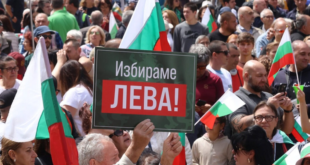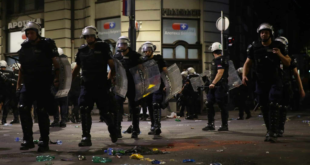The Hungarian PM’s trip to Moscow further cements his turn away from the West, while Poland and Czechia say they have agreed to settle a long-running dispute over a lignite mine on the border.
his is a peace mission,” insisted Hungarian Prime Minister Orban ahead of his controversial visit to Moscow for talks with Russian President Vladimir Putin on Tuesday.
The meeting was originally characterised as a purely business-related discussion about energy issues, but as criticism grew inside the EU and even within neighbouring Visegrad Four countries, Orban shifted the narrative to one where he would negotiate on behalf of the EU and NATO in order to ease tensions over Russia’s threatening of Ukraine by massing tens of thousands of troops at its border.
“I got convinced today that the existing differences in positions can be bridged and it is possible to sign an agreement that would guarantee peace, guarantee Russia’s security and is acceptable for NATO member states as well,” Orban remarked affably. He also underlined his belief that any international sanctions on Russia would not bear any fruit and be more detrimental to Hungary than to Russia.
Orban and Putin used to meet once a year before the COVID-19 pandemic hit, and this was their 12th reunion, but probably the longest, which at five hours is an unusually lengthy discussion in diplomatic terms, indicating perhaps sharp disagreements behind the scenes.
One of those is surely the long delay in the Russian-designed and financed Paks 2 nuclear power plant, which was originally planned to be operational by 2026, but still lacks some key licenses. Experts are now wondering whether Orban might be trying to find a way out of the deal, especially given the parlous state of the Hungarian budget and the 10-billion-euro Russian credit – even if the principal only has to start being repaid after 2031 – would represent a significant burden for the Orban government if re-elected on April 3.
Orban also asked Putin for an extra 1 billion cubic metres (cm) of natural gas from Gazprom, on top of the already-agreed 4.5 billion cm negotiated last year as part of Hungary’s long-term gas contract. The price of the gas supplies was not revealed, but experts ruled out that Hungary would be able to purchase it at one-fifth of the European average price, mentioned in passing by the Russian president. “Putin could have mistaken Hungary with Belarus,” energy expert Andras Deak said at a panel discussion organized by Hungarian think tank Political Capital the day after the summit meeting.
Orban also received a surprise gift from Putin: a $2 billion credit line to build a freight rail line – similar to the Chinese financed Belgrade-Budapest railway – from the Hungarian-Ukrainian border to the Western Hungarian city of Gyor.
But the main theme picked up international observers was that Orban stood idly by while Putin lashed out against NATO, calling NATO enlargement – including that of Hungary and other Central and Southeast European countries – a mistake and a breach of promises made to former Soviet leader Gorbachev by Western leaders. Putin named Romania, Poland and the Baltics as those whose accession was a deceit for Russia, but was polite enough not to mention Hungary with Orban standing at his side. Even so, he left no opportunity for Orban to clarify his position, which might’ve involved admitting NATO is currently the most popular international organization in Hungary and that NATO accession was supported by 85 per cent of the population in a referendum in 1997 (although on a low turnout of 49 per cent).
Zoltan Sz. Biro, a renowned Russian expert described Orban’s behaviour as a serious political mistake and a sign of his breaking solidarity with the West.
Despite a slow start, the Polish government this week took more determined steps to demonstrate its support for Ukraine. On the same day that Orban was cozying up to Moscow, Polish Prime Minister Mateusz Morawiecki visited Kiev where he promised to help Ukraine with gas and arms supplies as well as humanitarian aid. Morawiecki promised tens of thousands of rounds of artillery ammunition, light mortars, man-portable air defence systems and surveillance drones.
“This is a moment in which all of Europe and the Western world must unite around the cause of the sovereignty, independence and territorial integrity of Ukraine,” the Polish prime minister said during a press conference on Tuesday in Kiev. “Our part of Europe does not experience earthquakes or volcano eruptions, even if living close to a neighbour like Russia we have the feeling of living at the foot of a volcano.”
With Morawiecki visiting Kiev on the same day as UK Prime Minister Boris Johnson, Ukrainian President Volodymyr Zelensky also announced that a three-way partnership between the UK, Poland and Ukraine would be initiated, with the purpose of deterring the Russian threat.
On Wednesday, the US administration confirmed it would increase its military presence on NATO’s eastern flank, with 2,000 new troops brought in from Fort Bragg, North Carolina to Germany and Poland, while 1,000 soldiers would be relocated from Germany to Romania. The US administration specified that it was not sending troops to Ukraine itself.
Polish Defence Minister Mariusz Blaszczak posted on Twitter on Wednesday that his country welcomes the additional 1,700 US troops on top of the 5,000 soldiers from NATO allies already stationed there. “It is a strong signal of solidarity in response to the situation in Ukraine,” Blaszczak tweeted.
Czechs and Poles compromise on Turow; trash and glamour in Czechia
Polish Prime Minister Mateusz Morawiecki was in Prague on Thursday to seal a compromise deal between the two countries over the contentious extension of Poland’s Turow lignite mine and the adjacent Turow power plant.
Earlier in the day, the Polish Press Agency (PAP) had announced that, after days of negotiations, the two parties had signed a deal, whose content though was not made immediately public. On Wednesday night the Polish government approved the deal in an expedited procedure, according to PAP.
The onet.pl news site, relying on unofficial sources, reported on Thursday that the agreement involves Poland paying 45 million euros to Prague in exchange for the latter dropping its court case at the Court of Justice of the European Union (CJEU). The CJEU had imposed a fine of half a million euros per day on Poland for as long as it continues to operate the mine.
Those details were confirmed by the Polish prime minister and his Czech counterpart Petr Fiala at a press conference in Prague on Thursday. The deal actually allows the mine to remain operating without obstacles, while also including a series of investments to address issues relating to water draining from Czech villages and other environmental damage.
“We’re done with negotiations, which were difficult and conflictual, but finished with success,” Morawiecki said in Prague. “This puts an end to the period of stagnation in the otherwise very good Polish-Czech relations. We are opening a new chapter today. This is what we, as neighbours, need.”
While Hungarian and Polish politics have different loyalties in the Ukraine-Russia crisis, the Czechs, as usual, manage to argue amongst themselves. While the new government in Prague is busy rallying support and sourcing weapons for Ukraine, Czech President Milos Zeman may be the only European politician closer to Vladimir Putin than Orban.
The Czech head of state has lost much of his mojo due to recent health problems, as well as a series of diplomatic catastrophes between Prague and Moscow in recent years, but there’s little doubt about the allegiance of Zeman and his inner circle. And just how deep that allegiance goes is now under investigation.
Perhaps the biggest hit to Czech-Russian relations since the Warsaw Pact invasion of 1968 came last year when it was revealed that Russian agents were behind the 2014 explosion of the Vrbetice ammunition dump. After then prime minister Andrej Babis announced the findings of the BIS intelligence services in April, dozens of diplomatic staff were ejected from the two countries.
But it is now suspected that Moscow might have got the heads-up about the findings before Babis. According to Czech Radio and the Respekt weekly, police have launched an investigation into whether the presidential office – which received the BIS report at least a week before it was sent to the prime minister – has intentionally shredded its copy in order to prevent it being examined.
The intelligence services had wanted to take fingerprints over suspicions that it was handled by unauthorised people. That is a clear reference to Zeman’s top two advisors: Vratislav Mynar and Martin Nejedly. Both have deep Russian links and lack security clearance.
The presidential office has neither confirmed nor denied that the document was shredded. However, it claims that the report was only handled by authorised personnel. The delay in giving it to Zeman, it adds, was because BIS did not mark it with the appropriate code to note its urgency.
“The bottom line is this,” tweeted Respekt journalist Ondrej Kundra. “The castle has shredded secret material so the police can’t find out if anyone who didn’t have the right to access the information did so, such as Russia.”
Investigations are also ongoing over a slightly less weighty matter: the 2 million koruna (80,000 euros) paid out by the Finance Ministry for glamourous photos of former minister and current MP Alena Schillerova that she then plastered all over social media.
The former finance minister’s largesse in employing two professional photographers to shoot her wondering amid springtime flowers and petting cute animals in soft focus is embarrassing for Babis. The head of the ANO party often boasted of how he was fighting to slash government costs and waste.
“I like it. In the evening I come home, lie in bed, take the phone and look at what people write to me, what they think about what I was wearing and what my hair was like,” the 58-year-old Schillerova said last year.
However, her tune has changed somewhat since a freedom of information request revealed just how much Czech taxpayers handed over to enjoy critiquing such ministerial glamour. After several days of silence, Schillerova insisted that the photos were really just part of the ministry’s standard promotional and media service. The more personal shots, she claims, were billed to ANO.
Babis, who is widely expected to launch a bid to win next year’s presidential elections, quickly retorted that his party would not be footing the bill.
The photographers were on staff at the ministry for 14 months. It has not been revealed whether the new finance minister, Zbynek Stanjura, has retained their services in his own bid for social media glory.
Slovaks blame US for Ukraine tension; billions at stake as EU funds lay untouched
As tensions on the border with Ukraine unsettle Slovakia, more and more locals are starting to point fingers westward as the blame-game for the situation escalates.
The latest polls indicate that close to half of Slovaks believe that the US and NATO are responsible for the tension on Ukraine’s eastern frontier. On the other side of the barricades stands near 35 per cent of the population convinced that Russia is to blame for the crisis, while the rest remain undecided. Pollsters point out that the US and NATO are held liable by an overwhelming majority of far-right voters and supporters of opposition parties, while coalition sympathisers are convinced of the opposite.
Polarised attitudes were fanned by revelations that NATO is pondering deploying a 1,000-strong contingent to Slovakia, with additional reinforcements sent to Hungary, Bulgaria and Romania. While such a plan remains only an option for the time being and would eventually require Slovakia’s assent, Foreign Minister Ivan Korcok already confirmed discussions had taken place on the issue.
Prime Minister Eduard Heger later stated that Slovakia will accommodate NATO’s troops on its eastern border, “if it is in the interest of the country and the EU,” the Dennik N daily reported. Meanwhile, after days of hesitation, the Foreign Ministry officially advised against travelling to Ukraine, bar necessary journeys. It also warned against attending protests and gatherings of large crowds in the country.
President Zuzana Caputova echoed Heger’s words when she claimed that strengthening the defence of Slovakia’s eastern border, along with the entire eastern wing of NATO by Alliance units, is in the country’s own interest. If Slovakia doesn’t accept NATO’s offer of 1.000 troops and “becomes the only country on NATO’s eastern wing without allied forces, we will simply become a target and the weakest link,” the president told Radio Expres.
Her words drew immediate criticism from opposition politicians, including former prime minister Robert Fico who, in a bout of unsolicited irony, advised Caputova to apply for US citizenship and take up the soon vacant seat of the US Ambassador to Slovakia. US President Joe Biden has chosen Bridget Brink, the current US ambassador in Bratislava, to be his new ambassador in Kiev.
MPs from Fico’s Smer-SD party had previously castigated Caputova as a “US agent” and the president now says she is considering taking legal action against her detractors. “It’s absurd and I’ve had enough,” she said during the Radio Expres talkshow. “Such statements are lies, and I’m convinced that the people voicing them know they’re lying.”
Meanwhile, Slovakia is on the verge of losing out on billions of euros in EU funds as Investment Minister Veronika Remisova’s department struggles to spend the money designated for projects chosen by Brussels, according to revelations by Index.
Last year, Remisova took flak for failing to redirect more than a billion euros in EU funds to counter the COVID-19 pandemic, causing the country to allegedly miss out on the large sum. While Remisova initially claimed that the money could still be spent by the end of 2023, investments have stalled and the minister is now reportedly asking the European Commission for an exceptional relocation of the unused funds – the fate of which now hangs in the balance.
But Brussels is said to have already criticised Slovakia in unofficial communication for its dismal track record in the effective transfer of EU money. Remisova countered by highlighting the absolute transparency of the investment processes, however the EU is far from appeased. As first reported by Index, the European Commission considers drawing the remainder of the untouched money a “challenge” and is worried about the effective use of billions of future funds.
No jabs Jobbik
Peter Jakab, chairman of the former extreme-right Jobbik party, announced this week that he is launching a petition against mandatory COVID-19 vaccination in Hungary. The announcement caught most Hungarians by surprise, as neither the government nor the opposition is seriously considering the introduction of mandatory vaccination, except in a few special sectors, like health care, education and law enforcement. Orban said last September that he could not make vaccination mandatory, because the “stomach of Hungarians would simply not accept it”.
Jakab, who failed during the primaries in his bid to lead the joint opposition in the upcoming April 3 election but has remained part of the united opposition, is visibly struggling to find a narrative to mobilize his voters. This may explain his claim now that, “the government is introducing mandatory vaccination in more and more areas. Jobbik refuses to make vaccination mandatory. Everyone is free to decide whether or not to take the vaccine.”
Previously, the only Hungarian party campaigning against vaccination was the extreme-right fringe party Mi Hazánk (Our Fatherland), polling at around 3 per cent. A recent poll shows that 59 per cent of Hungarians oppose mandatory COVID-vaccination, up from 44 per cent in last November. Hungary’s united opposition has not commented on Jakab’s surprise statements.
Polish president proposes to liquidate Disciplinary Chamber for judges
Polish President Andrzej Duda proposed Thursday to completely liquidate the Disciplinary Chamber at the Supreme Court – a new body created by Law and Justice (PiS) after coming to power that critics say has been used to retaliate against critical judges.
The Disciplinary Chamber is at the core of the rule-of-law conflict between Poland and the European Commission, leading to several rulings against Poland by the Court of Justice of the European Union (CJEU). Late last year, the CJEU actually fined Poland a record 1 million euros per day because it refused to implement an earlier ruling ordering it to dismantle the chamber.
Duda proposed that judges sitting on the chamber should either go into retirement or move to other judicial bodies, and suggested a new “[Chamber] for Professional Responsibility”, with 11 sitting judges, be created at the Supreme Court. This new chamber would take on the role of supervising professional responsibility among judges and its members would be elected at random from the pool of Supreme Court judges. Most chambers at the Supreme Court are by now controlled by PiS.
Duda’s proposal, alongside the Turow deal, shows Poland is trying to deal with the two sources of the costliest penalties imposed on it by the CJEU. Yet even if these are both resolved, the government still has to take steps to ensure that funds from its slice of the EU’s giant coronavirus recovery plan and the next EU budget are released by the European Commission and disbursed to Poland.
 Eurasia Press & News
Eurasia Press & News



